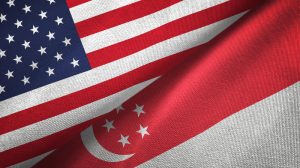President Joe Biden’s nominee to fill the long-vacant post of U.S. Ambassador to Singapore has said that he aims to “promote shared prosperity” and build on the longstanding security ties between the two nations.
Technology entrepreneur Jonathan Kaplan, who was nominated for the post by Biden in July, made the remarks Wednesday during a Senate confirmation hearing for the president’s nominees for ambassadors to Singapore, China, and Japan.
During the hearing, Kaplan noted that Singapore is a “vital economic partner” for the U.S. and planned to “strengthen our bilateral trade relationship, advance an economic agenda that promotes a shared prosperity, further secure economic resiliency and our access to supply, and work with Singapore to tackle the climate crisis.” He also said that he would look for opportunities to strengthen the security partnership between the two nations.
Interestingly, Kaplan also flagged his intention to press the Singaporean government to change its stance on press freedom, describing this as a “a priority.” “They may not want to change, we’re going to want them to change, but we’re going to have a dialogue,” he said. “This is an area of fundamental freedoms, this is a topic of importance for the administration, and this is a priority for me.” He added, “The nice thing is friends are able to talk about difficult topics.”
Assuming he is confirmed, Kaplan’s deployment to Singapore will bring to an end more than four years in which Washington has been without high-level diplomatic representation in the city-state, one of its most enduring and reliable partners in Asia.
The Singapore vacancy reflects Washington’s larger diplomatic vacuum in Southeast Asia. This largely exists due to the politically motivated stonewalling of Senator Ted Cruz (R-TX), who has vowed to block Biden’s State Department nominees until the government imposes congressionally mandated sanctions on the Nord Stream 2 pipeline linking Russia and Germany.
The U.S. currently has no ambassador in either Thailand or the Philippines – both of them treaty allies – nor to Brunei, which holds ASEAN’s rotating chairmanship this year. Neither is there a confirmed U.S. ambassador to ASEAN itself. In Indonesia, meanwhile, recently confirmed Ambassador to Indonesia Sung Kim is juggling his job in Jakarta with a side-job as Biden’s special envoy to North Korea.
Kaplan’s first areas of priority – economic and security cooperation – are likely to ensure him a warm welcome from the ruling People’s Action Party (PAP). His second – pressing Singapore’s mandarins on press freedom – will likely be met with a polite but chilly reception. The PAP government has generally been intolerant of Western attempts to prod it in the direction of greater openness or evangelize liberal causes, something that has provided one of the few points of friction in an otherwise solid relationship.
In defending the need for its controversial Foreign Interference (Countermeasures) Act (FICA), which was passed by Parliament earlier this month, the Ministry of Home Affairs made explicit reference to the 1988 expulsion of an American diplomat of meeting with, and allegedly cultivating, opponents of the PAP. An official statement issued at the time accused the diplomat and his superiors of acting “as if they were the colonial power and Singapore their protectorate.”
The Ministry was notably more reticent about more recent cases of foreign interference involving China, which perhaps speaks to the high degree of mutual comfort in the Singapore-U.S. relationship. That these sorts of issues come up so rarely also reflects the fact that American promotion of liberal values generally proceeds in inverse relation to the warmth and perceived strategic salience of any given bilateral relationship. Most likely, Kaplan’s comments on press freedom were confirmation boilerplate, which will be quietly set to one side after his arrival in Singapore. Otherwise, as the journalist and activist Kirsten Han put it on Twitter, “I suspect the PAP government will just tell him to FICA off.”
































